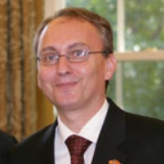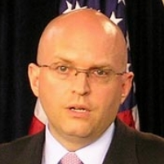Macedonia
The first Macedonian to reach America may have been Dragan of Ohrid. Numerous legends surround this colorful figure who probably sailed with Columbus to America and may have returned to the New World with his own expedition to the marshy swamplands of modern-day Venezuela, which Dragan named “Venezia” for its similarities to the lagoon-laced Italian city.
The United States formally recognized Macedonia on February 8, 1994, and the two countries established full diplomatic relations on September 13, 1995. The US Liaison Office was upgraded to an embassy in February 1996, and the first American ambassador to Skopje arrived in July 1996. In deference to its ally, Greece, the US officially recognized Macedonia as the Former Yugoslav Republic of Macedonia. But that changed on November 4, 2004 when the Bush administration gave recognition to “Macedonia” only, much to the consternation of officials in Athens.
US imports from Macedonia totaled $72.7 million in 2007, led by steelmaking and ferroalloying materials (unmanufactured) at $37.1 million (after registering $0 in the previous years). Other imports on the rise include nickel, up from $0 to $6.8 million, tobacco, and waxes and nonfood oils, up from $7.9 million to $10.4 million.
Macedonia Takes Greece to Court over Name, NATO Dispute
The 2007 State Department report on human rights in Macedonia found that police abuse of suspects continued to be a problem, and there were allegations of police harassment of ethnic minorities. Also, corruption in the interior and justice ministries, and political pressure exerted on them, the courts, and the public prosecutor’s office, impeded the investigation and prosecution of some allegations of human rights abuse. In addition, societal discrimination against ethnic minorities, particularly Roma, continued to be a problem.
Christopher R. Hill
Appointment: Jul 2, 1996
Presentation of Credentials: Jul 29, 1996
Termination of Mission: Left post Aug 2, 1999
Appointment: Jul 7, 1999
Presentation of Credentials: Sep 7, 1999
Termination of Mission: Left post Nov 4, 2001
Appointment: Apr 1, 2002
Presentation of Credentials: Apr 22, 2002
Termination of Mission: Mar 26, 2005
Appointment: Aug 2, 2005
Presentation of Credentials: Sep 6, 2005
Termination of Mission: 2008
 Jolevski, Zoran
Jolevski, Zoran
- Table of Contents
- News
- Overview
- Basic Information
- History
- Newspapers
- History of U.S. Relations with Macedonia
- Current U.S. Relations with Macedonia
- Where Does the Money Flow
- Controversies
- Human Rights
- Debate
- Past Ambassadors
- Ambassador to the U.S.
- Embassy Web Site in the U.S.
- Comments
- Leave a comment
U.S. Ambassador to Macedonia

On July 8, 2014, President Barack Obama announced the nomination of Jess L. Baily, a career Foreign Service officer, as ambassador to the Republic of Macedonia. It will be the first ambassadorial posting for Baily.
The son of Oliver and Joan Baily, Jess Baily, a native of Cincinnati, graduated from St. Paul’s School in Concord, New Hampshire, in 1978 and had an early focus on joining the Foreign Service. After high school he earned a B.A. in History and French Literature in 1982 from Yale and an M.A. from Columbia in European History in 1985.
Before joining the State Department, Baily worked at AMIDEAST, a non-profit organization that has training programs in English and other subjects for professionals in the Middle East and sponsors student exchanges between the United States and Middle Eastern nations.
Baily started work at the State Department in 1985, initially at the U.S. Information Agency (USIA). His early assignments included the U.S. embassies in Dakar, Senegal, and Dhaka, Bangladesh. In 1992, Baily became the binational center director at the embassy in Bangkok, Thailand. He returned to the United States in 1994 as the USIA desk officer for Francophone West Africa and was named a senior advisor in the office of USIA’s deputy director in 1995. Baily’s next USIA assignment was as the agency’s representative to the American Foreign Service Association.
In 1998, Baily went overseas again, this time to Turkey as cultural affairs officer in the embassy in Ankara, and then as information officer. He was transferred to the Netherlands in 2002 as counselor for public affairs in the embassy in The Hague.
Baily returned to the United States in 2005 as director of the Washington Foreign Press Centers. The foreign press centers, currently in Washington and New York, facilitate access for members of foreign media to U.S. government officials, political figures and information. The centers frequently sponsor foreign-only briefings and tours for reporters.
Beginning in 2007, Baily served a tour leading the State Department’s regional reconstruction team in Erbil, Iraq, which is in the Kurdish northern region of the country. He returned to Washington in 2008 as director of the Office of United Nations Political Affairs, which develops, coordinates and implements U.S. policy on political issues that are before the UN Security Council. In 2010, Baily was named director of the Office of Southeast European Affairs, where he managed bilateral relations between the United States and Turkey, Greece and Cyprus.
Baily returned to Turkey as deputy chief of mission in Ankara in 2011, where he has worked since.
Baily’s wife, Capie Polk Baily, is a former Foreign Service Officer. The couple has one son, Noah. Baily speaks Turkish, French and Thai.
-Steve Straehley
To Learn More:
Diplomat Leads Iraq Team (by Malia Rulon, Philadelphia Enquirer)
State Department Cables (WikiLeaks)
morePrevious U.S. Ambassador to Macedonia

A native of Pennsylvania, Philip T. Reeker was nominated by President Bush on March 18, 2008, to be US Ambassador to Macedonia. He was confirmed by the Senate on August 1 and sworn in on September 10. Reeker received a BA from Yale in 1986 and an MBA from the Thunderbird School of Global Management in Arizona in 1991.
The first Macedonian to reach America may have been Dragan of Ohrid. Numerous legends surround this colorful figure who probably sailed with Columbus to America and may have returned to the New World with his own expedition to the marshy swamplands of modern-day Venezuela, which Dragan named “Venezia” for its similarities to the lagoon-laced Italian city.
The United States formally recognized Macedonia on February 8, 1994, and the two countries established full diplomatic relations on September 13, 1995. The US Liaison Office was upgraded to an embassy in February 1996, and the first American ambassador to Skopje arrived in July 1996. In deference to its ally, Greece, the US officially recognized Macedonia as the Former Yugoslav Republic of Macedonia. But that changed on November 4, 2004 when the Bush administration gave recognition to “Macedonia” only, much to the consternation of officials in Athens.
US imports from Macedonia totaled $72.7 million in 2007, led by steelmaking and ferroalloying materials (unmanufactured) at $37.1 million (after registering $0 in the previous years). Other imports on the rise include nickel, up from $0 to $6.8 million, tobacco, and waxes and nonfood oils, up from $7.9 million to $10.4 million.
Macedonia Takes Greece to Court over Name, NATO Dispute
The 2007 State Department report on human rights in Macedonia found that police abuse of suspects continued to be a problem, and there were allegations of police harassment of ethnic minorities. Also, corruption in the interior and justice ministries, and political pressure exerted on them, the courts, and the public prosecutor’s office, impeded the investigation and prosecution of some allegations of human rights abuse. In addition, societal discrimination against ethnic minorities, particularly Roma, continued to be a problem.
Christopher R. Hill
Appointment: Jul 2, 1996
Presentation of Credentials: Jul 29, 1996
Termination of Mission: Left post Aug 2, 1999
Appointment: Jul 7, 1999
Presentation of Credentials: Sep 7, 1999
Termination of Mission: Left post Nov 4, 2001
Appointment: Apr 1, 2002
Presentation of Credentials: Apr 22, 2002
Termination of Mission: Mar 26, 2005
Appointment: Aug 2, 2005
Presentation of Credentials: Sep 6, 2005
Termination of Mission: 2008
 Jolevski, Zoran
Jolevski, Zoran
Comments
U.S. Ambassador to Macedonia

On July 8, 2014, President Barack Obama announced the nomination of Jess L. Baily, a career Foreign Service officer, as ambassador to the Republic of Macedonia. It will be the first ambassadorial posting for Baily.
The son of Oliver and Joan Baily, Jess Baily, a native of Cincinnati, graduated from St. Paul’s School in Concord, New Hampshire, in 1978 and had an early focus on joining the Foreign Service. After high school he earned a B.A. in History and French Literature in 1982 from Yale and an M.A. from Columbia in European History in 1985.
Before joining the State Department, Baily worked at AMIDEAST, a non-profit organization that has training programs in English and other subjects for professionals in the Middle East and sponsors student exchanges between the United States and Middle Eastern nations.
Baily started work at the State Department in 1985, initially at the U.S. Information Agency (USIA). His early assignments included the U.S. embassies in Dakar, Senegal, and Dhaka, Bangladesh. In 1992, Baily became the binational center director at the embassy in Bangkok, Thailand. He returned to the United States in 1994 as the USIA desk officer for Francophone West Africa and was named a senior advisor in the office of USIA’s deputy director in 1995. Baily’s next USIA assignment was as the agency’s representative to the American Foreign Service Association.
In 1998, Baily went overseas again, this time to Turkey as cultural affairs officer in the embassy in Ankara, and then as information officer. He was transferred to the Netherlands in 2002 as counselor for public affairs in the embassy in The Hague.
Baily returned to the United States in 2005 as director of the Washington Foreign Press Centers. The foreign press centers, currently in Washington and New York, facilitate access for members of foreign media to U.S. government officials, political figures and information. The centers frequently sponsor foreign-only briefings and tours for reporters.
Beginning in 2007, Baily served a tour leading the State Department’s regional reconstruction team in Erbil, Iraq, which is in the Kurdish northern region of the country. He returned to Washington in 2008 as director of the Office of United Nations Political Affairs, which develops, coordinates and implements U.S. policy on political issues that are before the UN Security Council. In 2010, Baily was named director of the Office of Southeast European Affairs, where he managed bilateral relations between the United States and Turkey, Greece and Cyprus.
Baily returned to Turkey as deputy chief of mission in Ankara in 2011, where he has worked since.
Baily’s wife, Capie Polk Baily, is a former Foreign Service Officer. The couple has one son, Noah. Baily speaks Turkish, French and Thai.
-Steve Straehley
To Learn More:
Diplomat Leads Iraq Team (by Malia Rulon, Philadelphia Enquirer)
State Department Cables (WikiLeaks)
morePrevious U.S. Ambassador to Macedonia

A native of Pennsylvania, Philip T. Reeker was nominated by President Bush on March 18, 2008, to be US Ambassador to Macedonia. He was confirmed by the Senate on August 1 and sworn in on September 10. Reeker received a BA from Yale in 1986 and an MBA from the Thunderbird School of Global Management in Arizona in 1991.







Comments